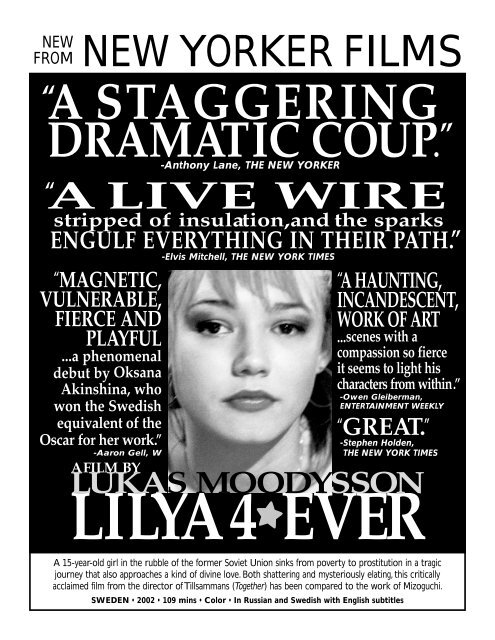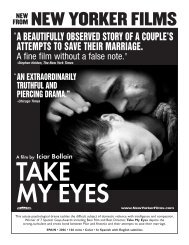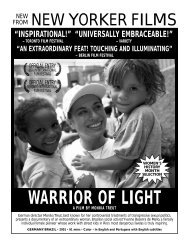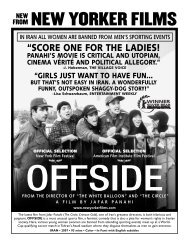âA STAGGERING DRAMATIC COUP.â - New Yorker Films
âA STAGGERING DRAMATIC COUP.â - New Yorker Films
âA STAGGERING DRAMATIC COUP.â - New Yorker Films
Create successful ePaper yourself
Turn your PDF publications into a flip-book with our unique Google optimized e-Paper software.
NEW<br />
NEW YORKER FILMS<br />
FROM<br />
“A <strong>STAGGERING</strong><br />
<strong>DRAMATIC</strong> <strong>COUP</strong>. ”<br />
-Anthony Lane, THE NEW YORKER<br />
“<br />
A LIVE WIRE<br />
stripped of insulation,and the sparks<br />
ENGULF EVERYTHING IN THEIR PATH.”<br />
-Elvis Mitchell, THE NEW YORK TIMES<br />
“MAGNETIC,<br />
VULNERABLE,<br />
FIERCE AND<br />
PLAYFUL<br />
...a phenomenal<br />
debut by Oksana<br />
Akinshina, who<br />
won the Swedish<br />
equivalent of the<br />
Oscar for her work.”<br />
-Aaron Gell, W<br />
“A HAUNTING,<br />
INCANDESCENT,<br />
WORK OF ART<br />
...scenes with a<br />
compassion so fierce<br />
it seems to light his<br />
characters from within.”<br />
-Owen Gleiberman,<br />
ENTERTAINMENT WEEKLY<br />
“GREAT. ”<br />
-Stephen Holden,<br />
THE NEW YORK TIMES<br />
AFILM BY<br />
LUKASMOODYSSON<br />
LILYA4 -EVER<br />
A 15-year-old girl in the rubble of the former Soviet Union sinks from poverty to prostitution in a tragic<br />
journey that also approaches a kind of divine love. Both shattering and mysteriously elating, this critically<br />
acclaimed film from the director of Tillsammans (Together) has been compared to the work of Mizoguchi.<br />
SWEDEN • 2002 • 109 mins • Color • In Russian and Swedish with English subtitles
FILM REVIEW<br />
April 18, 2003<br />
Hopes Disintegrate Into a Life of Degradation<br />
STEPHEN HOLDEN<br />
In many ways the 16-year-old title character of Lukas Moodysson's<br />
great, heartbreaking “Lilya 4-Ever” could be any throwaway<br />
teenager living anywhere in the world. But growing up in a grim<br />
unidentified town somewhere in the former Soviet Union (much of the<br />
movie was filmed in Estonia) makes Lilya’s plight infinitely sadder than<br />
if she were an overprivileged brat mopily foraging in a land of plenty.<br />
Roaming through an impoverished town whose decrepit public<br />
housing resembles stacked-up rows of army barracks crumbling under<br />
a slate sky, the local youth have nothing to do but scrounge around for<br />
whatever drugs and booze they can come up with, although sniffing<br />
glue seems the most popular escape into oblivion.<br />
The movie, written and directed by the Swedish filmmaker who<br />
created a deeply humane, even-handed portrait of a 1970’s commune in<br />
“Together,” follows Lilya (Oksana Akinshina) on a descent into a hell<br />
whose inevitability only makes it feel all the more tragic.<br />
Lilya’s future, like that of thousands of other girls drifting through the<br />
wreckage of the former Soviet Union, looks so bleak that she will<br />
pursue almost any path that holds out the promise of a better life<br />
somewhere else. And like thousands of those girls, this vulnerable,<br />
credulous teenager, who prays earnestly to a cheap painting of an angel<br />
cradling a child and boasts of having the same birthday as Britney<br />
Spears, is tricked into bartering away her one readily marketable asset,<br />
her nubile body.<br />
Lilya’s story is a variation on countless true stories that have come<br />
out of Eastern Europe since the fall of Communism about the luring of<br />
desperate underage girls with false promises of jobs in other countries,<br />
where they find themselves enslaved and forced to turn tricks without<br />
pay. Promised a real job in Sweden by a decoy posing as a boyfriend,<br />
Lilya is handed a fake passport and plane ticket and sent abroad. Her<br />
prospective employer, who immediately confiscates her documents, is<br />
really a pimp in a ruthlessly well-organized international operation in<br />
human traffic.<br />
The most remarkable achievement of the film is its presentation of<br />
Lilya’s story as both an archetypal case study and a personal drama<br />
whose spunky central character you come to care about so deeply that<br />
you want to cry out a warning at each step toward her ruination.<br />
When first seen, Lilya is living in comfortable squalor with a tough,<br />
embittered mother (Ljubov Agapova), who barely tolerates her. Hardly<br />
a model child, Lilya is spirited, with a streak of defiance. Her hopes<br />
vault to the skies when her mother announces she is moving with her<br />
boyfriend to the United States, which the girl sees as the promised land.<br />
Those hopes are dashed when the mother decides her daughter<br />
should stay behind until she is sent for. Their parting, in which Lilya<br />
chases after her mother’s car for a final desperate embrace, then lands<br />
in a mud puddle, augurs all that is to come.<br />
The next day Lilya’s aunt Anna (Lilia Shinkareva), a hard-bitten<br />
crone, arrives to take care of her and immediately commandeers the<br />
apartment and forces her niece to move to a rundown hellhole, where<br />
she is left to fend for herself. When word comes from America that<br />
Lilya’s mother is renouncing all responsibility for her, she resorts to<br />
selling her body at the local disco.<br />
Through it all, she clings to her only friend, Volodya (Artiom<br />
Bogucharskij), a younger boy tossed out of the house by his brute of a<br />
father. And the scenes of these two children huddling against the cold<br />
in an abandoned submarine base are as forlorn as anything imagined by<br />
the Italian neo-realist cinema.<br />
With her initial earnings, Lilya buys Volodya (who dreams of being<br />
Michael Jordan) a basketball for his birthday. It’s the only nice present<br />
the boy has ever received, and his resentful father punctures it in a rage.<br />
One ugly message the film keeps hammering home is that poverty and<br />
hopelessness have stripped the adults of their humanity along with their<br />
hope, and their children must make their way in a Dickensian nightmare<br />
of indifference and abuse.<br />
In her final twitch of hope, Lilya naïvely places her trust in Andrei<br />
(Pavel Ponomarev), a debonair young Swede she meets in the disco,<br />
who drives a red sports car, buys her ice cream and courts her without<br />
demanding sex. Once she has given him her heart, he invites her to<br />
move to Sweden with him and makes the arrangements, promising he<br />
will join her in a few days. And in a scene even more agonizing than her<br />
mother’s leave-taking, Lilya bids goodbye to Volodya, who is left<br />
desolate, clutching a bottle of sleeping pills.<br />
Arriving in Sweden, Lilya is asked to hand over her passport to the<br />
stranger who meets her and drives her to a dreary industrial suburb,<br />
where she finds herself locked in a high-rise apartment. The next day,<br />
her new boss drags her to the first of countless assignations that the<br />
movie evokes in a devastating montage of her clients' contorted faces as<br />
they grunt and groan over her inert body and release themselves.<br />
For all its explictness (including two rape scenes), “Lilya 4-Ever”<br />
never feels exploitative. Although it flirts with sentimentality in its<br />
recurrent images of angels (as Lilya retreats into a world of fantasy,<br />
Volodya reappears with angel’s wings), the movie avoids straying into<br />
bathos. These images evoke the innocence of a soul whose body may<br />
be endlessly violated but who underneath it all remains essentially a<br />
child.<br />
LILYA 4-EVER<br />
Written and directed by Lukas Moodysson; in Russian and Swedish, with<br />
English subtitles; director of photography, Ulf Brantas; edited by Michal<br />
Leszczylowski; music by Nathan Larson; art director, Josefin Asberg;<br />
produced by Lars Jonsson. Running time: 109 minutes. This film is not rated.<br />
WITH: Oksana Akinshina (Lilya), Ljubov Agapova (Lilya's mother), Artiom<br />
Bogucharskij (Volodya), Elina Beninson (Natasha), Lilia Shinkareva (Aunt<br />
Anna), Pavel Ponomarev (Andrei) and Tomas Neumann (Witek).<br />
Available in 35mm and VHS public performance to universities, museums & other non-theatrical customers (all dates subject to theatrical approval)<br />
CALL NEW YORKER FILMS TOLL FREE: 1-877-247-6200<br />
85 Fifth Avenue, 11th floor, <strong>New</strong> York, NY 10003 • Tel: (212) 645-4600 • Fax: (212) 645-3232 • nontheatrical@newyorkerfilms.com

















